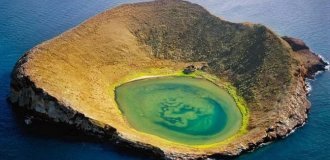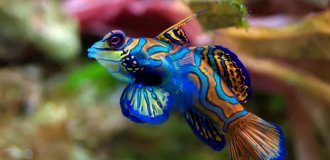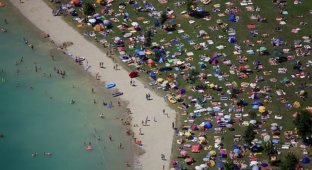Maroning: a pirate punishment that seems humane. But only at first glance (3 photos)
Man is a socially oriented creature. For a long time human society punished criminals by simply depriving them of their social support. That is, simply expelled. And this punishment, it is worth noting, considered by many to be the same as the death penalty. Only shelved her form - a loner simply had no chance to survive in the realities of the past. 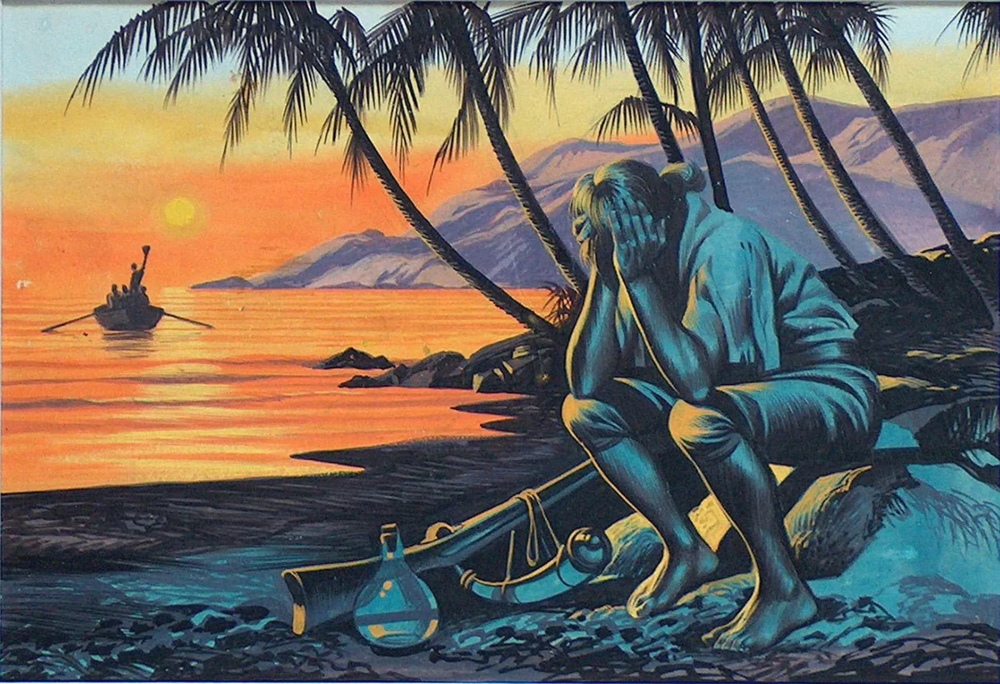
Artist. Ron Embleton
Interestingly, sailors adopted this practice. It was believed that this punishment is severe, but it seems to be more humane, than the death penalty. Yet the exiled had a ghostly chance of returning to human society. True, exile at sea has its own specifics. According to which the victim was left simply on the first counter piece of land. It happened that such an island turned out to be a simple cliff protruding from sea depths only at low tide. And therefore the visible humanity turned around in this case some refined, delayed cruelty. Although someone could get lucky.
In our view, maroning (isolation procedure convict on a desert island received just such a name) there is attribute of a pirate life. In fact, similar things happened in quite a civil courts, and in the navy. just for people of the past, such an exclusion of a person from society looked so stunning, harsh and brutal that it has become a literary template, cultural code. So when you suddenly need to do life description of piracy, maroning came in very handy. Because the to enhance the image, pirates began to be massively attributed (not always rightly) all kinds of horrors and passions.
It is interesting that how external, ritual gradations of the death penalty (ignoble hanging and very honorable execution, say), so isolation on a desert island had several standard solutions. The convict could leave a supply of food and fresh water (not very rich - resource limitation, as it were, stimulated a person engage in forced development of primitive conditions in the name of one's own salvation). And firearms were even added to this grocery set. weapons - pistol or musket. Often, however, with only one charge - so that a person has a chance to shoot himself. Or they could leave naked. And then superhuman luck was required to survive.
In theory, the poor fellow could have been picked up by some passing ship. But, given the congestion of the then trade routes and the intensity of their exploitation, such an opportunity could be expected some years. So after all all the same others waited!
At one time (already at the very end of a career) own team acted in a similar way with the famous pirate captain Edward England. Well, with three of his associates. And they managed not only to feed themselves, but also to concoct a primitive raft, on which they reached Mauritius to Madagascar. That's just the former glory and authority of a pirate even after such an epic deed, it was no longer necessary to experience - England ended his life in poverty, living on alms.
Alexander Selkirk, who became the prototype of Robinson Crusoe, also spent four years on a desert island. He's so fed up with the captain Whine to Stralding about the unsuitable seaworthiness of their ship, that he had landed him on the island of Mas a Tierra off the coast of what is now Chile. Selkirk rescued from loneliness four years later, the ships of the Woodes Rogers expedition. And here the ship with which it was written off was unlucky - it eventually sank almost with the whole crew, so that the boatswain's distrust of the ship turned out to be quite justified. Selkirk in general, by the way, according to the memoirs of contemporaries, distinguished by sobriety of thought and the gift of an intelligible story. 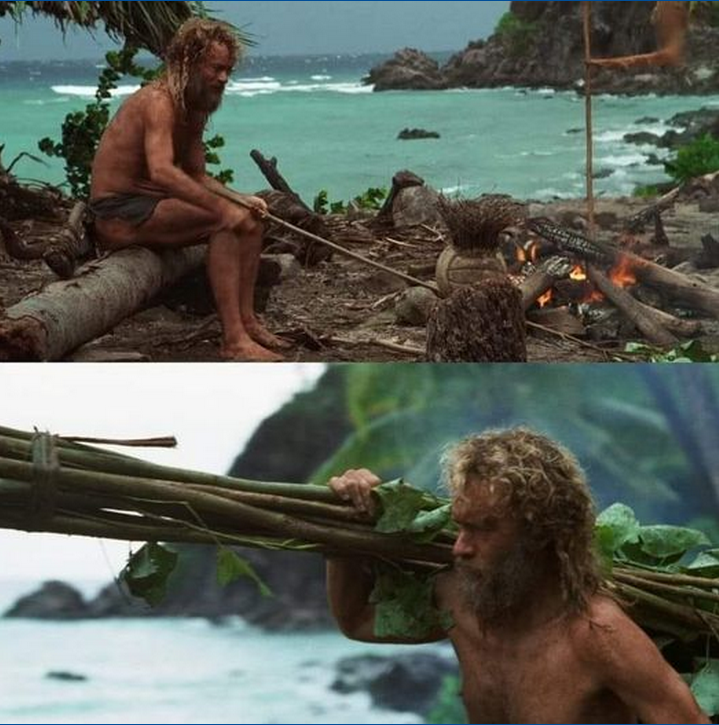
Tom Hanks in the movie Cast Away (2000)
Stevenson in the novel about the ownerless treasures of Flint faded the pirate Ben Gunn is landed in the same way on a desert island. Moreover, it seems that we are talking about a pirate, but only at the time of landing he served on a completely respectable merchant!
Interestingly, in 1714 the captain of the royal British Navy Warwick Lake landed his sailor (for case, they say) on one of the islands of Anguilla (in the Caribbean Sea). Togo rescued some time later by transit Americans. And a survivor sailor Robert Jeffery complained to the Admiralty about his former captain. AND Warwick Lake found guilty and fired from the Navy! Considered that he exceeded his authority.
Interestingly, the term "marooning" comes from the word "maron", meaning runaway slave. Moreover, initially marooning was used specifically to the runaway slave who managed to escape from persecution. And to former domestic cattle who escaped from the farm and managed to adaptto live independently in the wild. Besides, there was a poetic euphemism that replaced the word "maroning" in private, informal conversation. "Became governor of the island" was spoken of unfortunate, left in the middle of the ocean on the first convenient piece of land. AND only a few survived among them - the governorship turned out to be difficult, dangerous position. 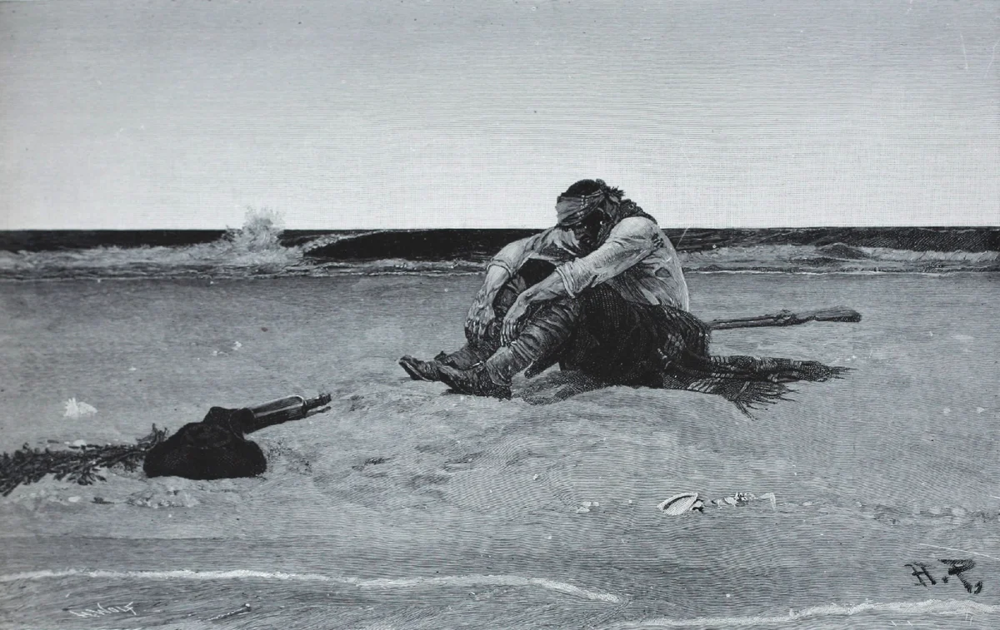
Alone with the sea. Artist. Howard Pyle
